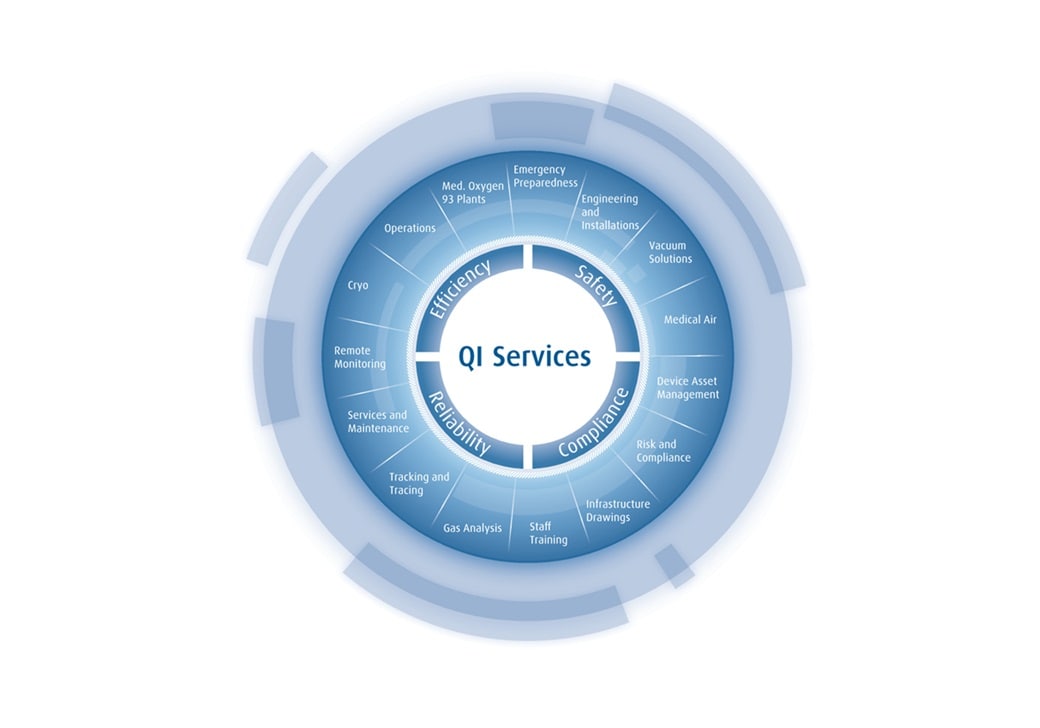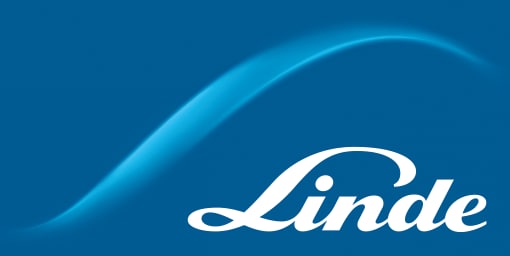
QI® Services
Information for professionals
Linde Healthcare has developed and performs several services and solutions
for safe and secure delivery of medical gases to patients in hospitals and healthcare facilities.
Innovating solutions in medical gas management
QI® stands for quality improvement. More than that, it is a view on the whole of your medical gas system and processes, bringing them up to best practice standards for quality as well as safety, reliability and efficiency.

QI® Services
With our broad QI® Services portfolio, Linde Healthcare can help you meet the considerable challenges of compliance and safety in today’s
healthcare environment. At the same time, we provide balanced insight and flexible tools to improve efficiency and coordination of medical gases throughout your facility.
Download:
QI services brochure
QI® Services areas
QI® Training provides courses for handling oxygen, storage, safe work procedures, emergency actions for medical gas systems, and technical management.
Compliance and safety are a key focus of our training packages for hospital staff, as well as issues specific to effective medical gas management, operating policy, and maintenance of medical gas piping and gas supply systems as well as medical devices.
QI® Training programmes cover essentials such as safe procedures for the handling, storage and use of compressed gas cylinders; safe working practices; and understanding of hazards associated with gases.
For medical and nursing staff, training typically covers the safe use, storage and handling of medical gases, and emergency actions for medical gas pipeline systems and cylinders.
Training courses are set up locally, and can comprise multiple modules designed to ensure the needs of a particular staff group are met. In addition, Linde Healthcare has developed
an e-learning solution, for some markets, to allow staff to complete their training about basic safety in their own time.
Read more:
Ensure Your Hospital is a Safe Place. QI® Risk provides inspection or survey of healthcare facility gas supply system for compliance to standards, to identify safety, equipment and procedural risks, and give recommendations for risk management.
For an overall assessment of your facility from a medical gas perspective, QI® Risk provides an in-depth inspection of the gas supply system in accordance with International Standards;
recognised Best Operating Practice and the respective country-specific Regulations. Starting from a site audit which focuses on, among other issues, safety, product and operational risks, recommendations
are then consequently given for safety improvements, risk management and compliance to standards.
An extended service can include establishing operational policy, maintenance and cylinder storage specifications, updating of pipeline drawings, design advice for supply system improvements and contingency planning.
Identify risks - Linde Healthcare will survey the medical gas related equipment and conduct interviews with your staff, covering all of the areas referred to in regulatory guidelines, standard operating procedures
and best practice. The audit will point out areas of non-compliance and include identification of potential risks and shortcomings in the following areas:
- ● Level of patient risk.
- ● Bulk tank sizing and advice on safe location.
- ● Gas supply equipment capacity and condition.
- ● Distribution systems.
- ● Manual handling.
- ● Management systems and documentation: preventative maintenance effectiveness.
- ● Training needs analysis.
- ● Cylinder storage and signage.
- ● Provision of equipment and emergency backup.
- ● Emergency preparedness
- ● Documented risk analysis
Identifying the risks in your hospital is not enough. They then need to be documented, prioritised and incorporated into your hospital’s risk register. We are able to provide a qualified, impartial and
pragmatic view of risk in your systems, using our experience with supplying medical gases for over 50 years. We apply verified risk analysis methodology using our own database to ensure consistency.
Some common risks identified by comparison to regulatory guidance and best practice include:
- ● No or limited nurse/ancillary staff training.
- ● No designated nursing or medical officer for gases.
- ● Inadequate product/prohibition/warning signage and emergency notices.
- ● Medical gas piping drawings incomplete/out of date.
- ● Operational Policy incomplete/out of date.
- ● No clear control of contractor operations.
- ● Inadequate storage/segregation of full and empty cylinders.
- ● No knowledge of standards/compliance shortcomings.
- ● No cylinder management programme in place.
- ● No designated storage points at ward level.
- ● Indistinct MGPS (Medical Gas Pipeline System) specifications.
- ● No indication of plant and system flow rate capacities/demand characteristics.
- ● Authorised Person not identified or sufficiently authorised.
- ● No planned maintenance programme.
- ● Establishing an Operational Policy
International and national standards require that a detailed Operational Policy is in place at each hospital to ensure pharmaceutical quality gas delivery to patients. This requires that a policy is developed
specific to the hospital and based on a comprehensive compliance survey. The policy should be detailed enough to promote best practice procedures and information.
Elements would include but not be limited to system description overview and operation, management responsibilities, identification of stakeholders and respective responsibilities,
staff training requirements, operation of the permit to work system, normal and emergency operational procedures, specifications of supply plant and manifold log sheets.
QI® ACCURA/QI® Tracking and QI® Securesupply are hospital medical gas services to track cylinders
as well as managing onsite stock for better medical gas logistics.
Managing the supply of medical gases should be secure, effective and easy. Depending on the market, our services may include:
- ● QI® Tracking. Online web service - from receipt to user to cylinder return. QI® Tracking cylinder management is a straightforward service
that enables the hospital facility to follow and use information about the location and status of its gas cylinders throughout the healthcare facility.
This can help to, for example, reduce the number of lost cylinders, locate cylinders in an urgent recall situation, trace
cylinders from a given batch at a recall, optimise cylinder use, reduce the time spent on administration and itemise cost to different users in the hospital.
Generally, QI® Tracking services work via scanning of an identification tag or label for the collection and storage of traceability data. This data is fed into a computer database, via installed software or a web server. Hospital staff can easily access the information as needed to trace cylinders, check stock levels or optimize needed stock on ward level, etc.
The advantages of QI® Tracking go beyond traceability. You can assess cylinder utilisation and allocation from an economic and facilities management perspective. A range of automatically generated reports may include updated information on location, stock levels, cylinder rotation, expiration dates, lost cylinders, cylinder balance and safety. - ● QI® Securesupply: Remote monitoring of onsite stocks - QI® Securesupply is a surveillance and remote control solution designed to help the hospital pharmacist
or technician get information on and manage stock of central sources of medical gas. The automatic gas supply system is based on remote control and telemetry, could be both for the bulk gas supply as well as the cylinder supply situation.
When supply reaches pre-determined levels, an order process is started by an electronic signal and prompts information about needed delivery of cylinders or the refilling of the bulk tank at the hospital.
The service enables savings in time and resources for continuous monitoring and re-ordering and avoids inadvertent stock outs. The supply process is secure and hospitals achieve optimised medical gas logistics.
Right From the Very Beginning.
QI® Design covers advisory and detailed sizing and construction plans for medical gas pipeline systems to meet standards, regulations and hospital clinical requirements.
Now, more than ever, it is vital to have secure design and engineering solutions. With QI® Design, Linde Healthcare provides a range of services from the
complete provision of designs to the review and assessment of in-house or contractor proposals.
Design of medical gas pipeline systems is a detailed and skilled operation that must ensure the plans meet both current Standards and Regulations
as well as the clinical needs of the hospital. Design would cover calculation of flow rates, pipe sizing, plant sizing, manifold and cylinder storeroom
sizing, ward based storage and recommendations for vessel positioning and locating of cylinder stores.
QI® Design services can work either from an outline brief to produce a full set of detailed drawings, or can be a consultancy or advisory role with
respect to proposals made by others for new installations or enlargements, new plant, layout changes etc. including formal assessment of contractor submissions.
At the Core of Your Pipework & Supply Systems.
QI Engineering offers expertise for new or refurbished medical gas system installation, commissioning, and start-up in the healthcare facility, in compliance to standards and regulations.
QI® Engineering offers you high quality hands-on expertise for the installation, testing, commissioning,
and start-up of customer-owned medical gas supply systems in hospitals, whether these are a new build or a refurbishment/enlargement.
Trained and experienced fitters, backed by Linde engineering resources, ensure that all installations are carried out strictly in
accordance with international and national Standards. Full certification is provided following each installation.
The service includes not only the installation, but also the full suite of tests, checks, procedures, and analyses as detailed in the relevant Standards and Regulations for the country.
QI® Engineering can also provide experts to carry out independent commissioning of new or modified medical gas pipeline systems, management of planned hospital shutdowns,
or onsite management of other contractors. Depending on the territory, the provision of Authorised Person (AP) services may also be available.
A Proactive Approach. QI® Maintenance helps to improve equipment and system reliability and efficiency, from supply to point-of-use.
Maintenance services ensure that the performance and reliability of gas equipment and pipelines are utmost in safety and compliance to guidelines. As nothing is more costly and frustrating
than unexpected interruptions, our services can help you to eliminate equipment deficiencies and improve cost efficiency through the reduction of gas consumption and a number of interruptions.
QI® Maintenance: Onsite maintenance both routine and response.
For hospital-owned installations, QI® Maintenance agreements are intended to safeguard the spectrum of equipment and systems between the supply unit and point-of-use. The services would
include regular inspection visits, emergency call outs by a trained service technician, repairs, or
periodic testing. Tailor-made solutions can also include comprehensive analysis, personnel training, control of failure risk, advice on compliance issues and assistance with any database updates.
QI® Maintenance ensures the installations meet the requirements of international Standards regarding specified intervals between services or can be used to monitor and control the
work of other contractors to ensure these meet the relevant Standards. Linde Healthcare can also provide rapid response solutions for emergencies in critical care areas.
QI® Point Analysis includes sampling and analysis of the quality of medical gases flowing through hospital pipelines to outlet, as to standards compliance and hospital safety.
QI® Point Analysis: Gas analyses ensure quality and safeguards patient safety.
Linde Healthcare boasts several years' experience carrying out gas analyses on behalf of the hospital sector and
pharmaceuticals industry. QI® Point Analysis samples and analyses the quality of the medical gases flowing through hospital pipelines to the gas outlet itself.
We provide a wide range of analyses, including medicinal air, medicinal oxygen, carbon dioxide (medical device) and medicinal nitrous oxide. All analyses
performed comply with current standards, including the European Pharmacopoeia (Ph.Eur), the Swedish Pharmaceutical Standard (SLS) and SIS HB 370.
We also handle analyses of non-medical gases, including a selection of speciality gases. It is necessary to perform gas analysis when installing a new central gas system,
following maintenance of a pipeline system or as a routine quality inspection.
The analysis service includes sampling, analysis and reporting, and sampling is always performed by Linde Healthcare's certified team.
Analysis vessels are always cleaned, inspected, and released by the laboratory before being used, and filled vessels are returned by our staff to the
laboratory for analysis in accordance with applicable standards. All procedures are fully documented in our quality system. The analysis report is subsequently issued to the client no later than 10 days after the
vessel reaches the laboratory. Where results deviate in relation to standard values, you will be contacted no later than 24 hours after this was detected. All analysis reports are archived for 10 years.
With our extensive knowledge of gases and gas analysis, we can advise on how, where and when samples should be taken. We have excellent insight into all relevant standards, and our laboratory is audited regularly.
QI® Medair (medical air, AMS) and QI® Medvac (medical vacuum, VMS) include services from design, supply and installation of medical oxygen supply to operation and maintenance of equipment, up to standards.
With QI® Medair (Medical Air, AMS) and QI® Medvac (Medical Vacuum, VMS), we provide services from design, supply and install to full provision of onsite plants.
All plant installs are fully compliant with international Standards and include three independent sources of air or vacuum. Linde Healthcare has many years of experience
operating such plants and longstanding relationships with leading component manufactures ensuring systems that are reliable, proven, and robust.
We handle the specification, sizing, design, installation, implementation, operation, and maintenance of the equipment as well as providing frequent analysis to ensure
compliance with GMP standards. With Medical Air we can also supply “Synthetic Air” installations either as the prime source or as backup to the compressors.
Depending on your area, we offer numerous business models from all-inclusive monthly fees for point-of-use air and vacuum provision to on call maintenance programmes.
An additional service may include dedicated supply to critical care areas in case of supply disruption in the regular network.
- QI® Training
- QI® Risk
- QI® ACCURA /QI® Tracking
- QI® Design
- QI® Engineering
- QI® Maintenance
- QI® Point Analysis
- QI® Medvac/Medair
QI® Training

QI® Training provides courses for handling oxygen, storage, safe work procedures, emergency actions for medical gas systems, and technical management.
Compliance and safety are a key focus of our training packages for hospital staff, as well as issues specific to effective medical gas management, operating policy, and maintenance of medical gas piping and gas supply systems as well as medical devices.
QI® Training programmes cover essentials such as safe procedures for the handling, storage and use of compressed gas cylinders; safe working practices; and understanding of hazards associated with gases.
For medical and nursing staff, training typically covers the safe use, storage and handling of medical gases, and emergency actions for medical gas pipeline systems and cylinders.
Training courses are set up locally, and can comprise multiple modules designed to ensure the needs of a particular staff group are met. In addition,
Linde Healthcare has developed an e-learning solution, for some markets, to allow staff to complete their training about basic safety in their own time.
 Downloads
Downloads
| Product datasheets & brochures | |
|---|---|

